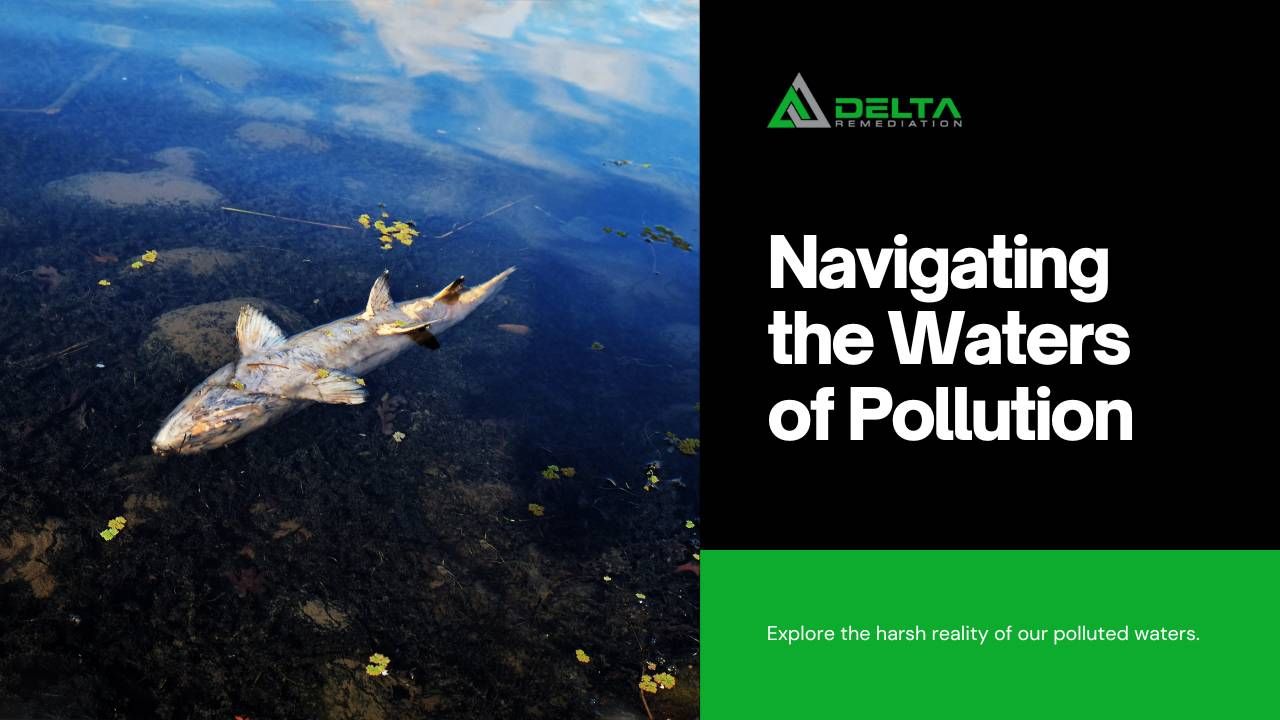Key Takeaways
- Understanding Water Pollution: Identifies the major threat to ecosystems, health, and economies.
- The Problem with Oil: Highlights the severe effects on water environments.
- Impact on Marine Life: Details how oil spills harm marine ecosystems.
- Innovative Solutions: Discusses advancements in cleaning up oil spills, with a focus on bioremediation and nanotechnology.
- Groundwater Remediation: Explains Delta Remediation’s approach to treating contaminated groundwater and surface water using Biologix technologies.
- Looking Ahead: Stresses the importance of research and cooperation for future solutions.
What is Water Pollution?
Water pollution occurs when harmful substances, such as chemicals, waste, and toxins, enter water bodies, leading to significant changes in water quality and the health of aquatic ecosystems. These pollutants come from a variety of sources including industrial discharges, agricultural runoff, wastewater treatment plants, and oil spills. Each source plays a role in degrading water quality and harming aquatic life.
The Issue with Oil Pollution
Oil spills, resulting from tanker accidents or offshore drilling, represent a major environmental disaster. When oil enters water, it forms a thick layer that can suffocate marine life, block sunlight necessary for aquatic plants, and disrupt the ecosystem’s balance. The aftermath of oil spills is a long-lasting negative impact on water quality and marine biodiversity, making recovery a lengthy and difficult process.
The Effects of Oil on Aquatic Ecosystems
The presence of oil in water bodies has a devastating impact on marine ecosystems. It coats marine animals and plants, leading to suffocation or poisoning. Birds and mammals affected by oil struggle to maintain body temperature, risking hypothermia. Fish populations may decrease due to reproductive problems, and the overall biodiversity in affected areas often suffers significantly.
Forward-Thinking Remediation Methods
Addressing oil pollution requires innovative remediation strategies. Bioremediation, which utilizes microorganisms to break down pollutants, offers a promising solution. This method leverages certain bacteria and fungi capable of converting hydrocarbons, the main component of oil, into harmless substances. Furthermore, Delta Remediation’s use of Biologix 100% Organic Remediation technology exemplifies a commitment to sustainable and effective cleanup methods.
Nanotechnology also presents a novel approach to oil spill remediation. By using nanomaterials designed to absorb oil while repelling water, this technology aims to enhance the efficiency of oil recovery efforts. Combined with improved physical recovery methods, such as skimming and containment booms, these technologies represent the cutting edge of environmental restoration.
Groundwater and Surface Water Remediation
Groundwater often acts as a pathway for contaminants, allowing them to move through and beyond areas impacted by contaminant releases, whether from above or below ground. At Delta Remediation, both surface and groundwater contaminated by organic contaminants can be effectively addressed using bioremediation techniques. Biologix technologies, which are 100% soluble in water, can easily attach to and then break down organic contaminants in aquifers as well as in above ground ponds or wetlands. In most cases, impacted soils and water can be identified and remediated through a single treatment event, demonstrating the efficacy and efficiency of these methods.
For a deeper understanding of how Delta Remediation tackles these environmental challenges, consider exploring their **groundwater and surface water remediation services.
The Path Forward
The challenge of addressing oil remediation in the context of water pollution is daunting but not insurmountable. With ongoing research, technological innovation, and international cooperation, more effective strategies for preventing and mitigating oil spills can be developed. It is crucial for governments, industries, and communities to work together to enforce stricter environmental protections, invest in clean technologies, and raise public awareness about the importance of preserving our water resources.
For individuals and organizations looking to learn more about water remediation services or to contribute to environmental restoration efforts, exploring Delta Remediation’s approaches and solutions is a valuable step. Those interested can reach out directly via the **contact page.
In conclusion, tackling water pollution, particularly from oil, is a critical environmental issue demanding immediate and sustained efforts. By deepening our understanding of the problem and embracing innovative solutions, we can strive towards a future where clean, thriving water bodies support diverse ecosystems and human societies alike.
Contact us to learn more about Delta Remediation’s role in innovative Groundwater & Surface Water remediation solutions.

